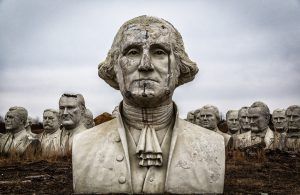Christopher J. Lee in Africa is a country:
I t is time to shift the geography of political tribalism in order to recognize the United States as a tribal society. This was the essence of the keynote speech given by Kwame Anthony Appiah at “A Night of Philosophy and Ideas” held at the Brooklyn Public Library on February 2, 2019. Though reading from a tablet, with his voice barely rising above the din of people still entering through the front doors, Appiah’s message was clear: the terminology frequently, and often gratuitously, applied to politics in Africa and more specifically Ghana, his childhood home, should now be applied to his home in the US. His perspective wasn’t entirely original—commentators as different as Steven Pinker, David Brooks and Amy Chua have also denounced recent American politics for devolving into tribalism. But Appiah’s views carried far more weight. Not only was this an instance of an African philosopher irreverently turning the tables of where tribalism exists in the world today, but here was an intellectual who could ground the issue in history. Tribalism in his lecture wasn’t simply generic western-speak for the absence of political civility. Appiah drew from firsthand experience.
t is time to shift the geography of political tribalism in order to recognize the United States as a tribal society. This was the essence of the keynote speech given by Kwame Anthony Appiah at “A Night of Philosophy and Ideas” held at the Brooklyn Public Library on February 2, 2019. Though reading from a tablet, with his voice barely rising above the din of people still entering through the front doors, Appiah’s message was clear: the terminology frequently, and often gratuitously, applied to politics in Africa and more specifically Ghana, his childhood home, should now be applied to his home in the US. His perspective wasn’t entirely original—commentators as different as Steven Pinker, David Brooks and Amy Chua have also denounced recent American politics for devolving into tribalism. But Appiah’s views carried far more weight. Not only was this an instance of an African philosopher irreverently turning the tables of where tribalism exists in the world today, but here was an intellectual who could ground the issue in history. Tribalism in his lecture wasn’t simply generic western-speak for the absence of political civility. Appiah drew from firsthand experience.
As Appiah explained in his opening remarks, “tribes” and “tribalism” are ordinary terms with common usage in Ghanaian English, unlike their pejorative—and frequently racist—meanings in American English. To invoke “tribal” identity is to signal an investment in cultural and historical affiliations that preceded modern Ghana, with language, region, and other facets defining what counts as tribal. Appiah went further to describe how his father, Joe Appiah, during the 1950s promoted a national Ghanaian identity over ethnic ones—in his case, an Asante heritage—in the buildup to and aftermath of Ghana’s independence. Though this principle of national over tribal identity was never entirely fulfilled, it remained an ideal, even when pride was taken in ethnic affiliation, as Anthony Appiah readily admitted to embracing. Put simply, tribal identity still matters.
But there is a difference between “tribe” and “tribalism.” The problem isn’t with tribe itself; the problem is when it is mobilized into the charged, confrontational and self-interested practice of tribalism. It is this antagonism that his father struggled against, and it is through this distinction that Appiah called upon the audience to do better in the present, to draw upon, in his words, “the better angels of our identities.” Appiah, it can be said, has never been part of a tradition of radical thought. His consistent emphasis throughout a number of books on individual choice in matters of identity and moral philosophy can be faulted for not taking full account of systemic hierarchies that inform civic identities and limit political agency. In this sense, his case against tribalism, when taken too narrowly, neglects the ways in which such practices have been institutionalized over time. Mahmood Mamdani has argued that ethnic conflict in postcolonial Africa can partly be attributed to the enduring structural legacies of indirect rule.
More here. (Note: Throughout February, we will publish at least one post dedicated to Black History Month)
